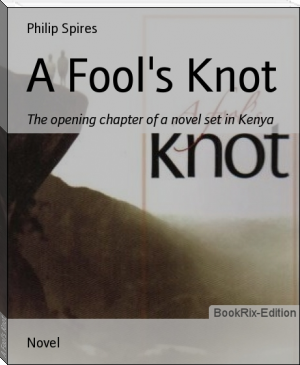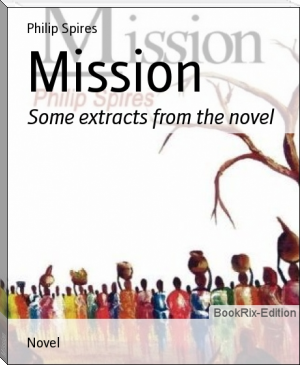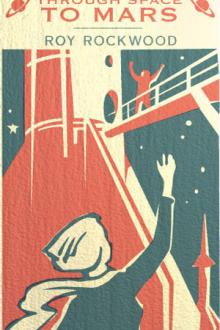A Fool's Knot by Philip Spires (best ebook reader for surface pro txt) 📖

- Author: Philip Spires
Book online «A Fool's Knot by Philip Spires (best ebook reader for surface pro txt) 📖». Author Philip Spires
CHAPTER ONE
August 1976
England is smaller now. The sky is smaller. Daylight is softer, paler than memories of the harsh brilliance of tropical sun. There are people everywhere: there is no space here. There are no mountains, no heavy clouds, flat-bottomed in the sky and stretching to the horizon as if floating on the surface of a lake covering the earth. There is no distance here. The horizon is near and the sun does not shine.
A tremble of regret, an emptiness born of shock, passed through Janet's body. Her eyes stared blankly as mile after predictable mile passed by unnoticed. She was glad to be home again, but this happiness could not override the sadness she felt at leaving the place where she had lived so happily for two years.
Though Migwani already felt a long way distant, it had perhaps felt more of a home than any other place that bore the name. Already it had become no more than a phase in her life, transformed by the hours of flight into a memory, outlived and outmoded. It was over and finished forever. How long will it be, she thought, as the drumming of the road filled her mother’s car, before I begin to live facing forwards instead of looking back to a destroyed past? How long before it is really over?
She looked down at the seat beside her on which rested the jumble of a parcel she had made up so carefully the previous morning. Protruding from beneath the string-tied newspaper wrapping, which had been torn during her long wait in queues after disembarking in London, was a strange array of barbed arrowheads, polished cow horns and the three unvarnished legs of a stool. Tied to one leg, and now swinging over the edge of the seat was a small gourd, a simple treasure, which meant more than all the other souvenirs and all the photographs with which she had returned. Of all the things she had brought home, this was the strongest reminder of everyday life in Migwani, an exact replica of those used in every household for carrying and storing water. She would polish it and use it as a vase for dried flowers. But protruding above and below the other trinkets and artefacts was the crudely fashioned but beautiful walking stick that had been Munyolo’s personal present for her. Surely this was something to treasure.
Her eyes were heavy with sleep. For two days life had been hectic. It seemed that time had passed too quickly to be noticed, like an immense dream half-remembered between two clear memories. One was the joy she felt when she knew that John had accepted her invitation to come to the farewell party in the school. The other, from only an hour before, was the tearfully overjoyed embrace of her mother at the airport. She looked older, Janet thought. David Smythe, the neighbour and childhood friend, who had offered to drive her mother’s car to the airport, had also changed, not that she had seen much of him in recent years. He remained the slightly overweight, goofy lad, who still lived with his parents over the road.
But her mother’s letters had referred at length to the help he had offered and the jobs he did for her. At least he was honest. He was both fatter and frailer than before. Both seemed to speak more slowly than she remembered. Was it really them? Had she really travelled those thousands of miles to return home with the feeling that she had never been away? She was not convinced - of anything, but there were truths that could not be ignored, truths locked into the trivialities of life, the very details of which, when remembered, make even dreams feel real. She had just come from the airport where her mother had greeted her arrival with such long warm embraces. She had felt great surprise when the car park attendant spoke to her in Swahili. Janet had insisted on paying the fee with the English coins she had faithfully kept for two years in a small box on her bedside table. Mistakenly she had included a Kenya shilling with them and the attendant, an Asian, handed it back saying, “Habari ya Kenya?” with a broad smile on his face. “Fine,” Janet had replied taking the coin. The event itself had been bland enough, but the real awakening for Janet was how strange the Swahili sounded. It was 'foreign’, no longer what she expected to hear. And how difficult it had been for her to answer in kind. She had sought the word but not found it; only 'fine' would come. Already a black face seemed a point of interest, an unexpected sight to be noticed and noted as different. Her suburban roots were already showing through.
There were things she would have to re-learn. She was sure of that. How long would it take? she wondered, thinking back to the hostess on the aircraft. A girl her own age, but Scottish and blonde, had set about her duties immediately the plane took off from Nairobi with a forthright confidence and clarity of purpose unknown to Migwani's lazy, timeless ways. Janet had been lucky to get a seat by a hatchway, where there was no seat in front and therefore no problem in setting down her large bulky parcel. Carrying an armful of trays to clip onto the aircraft seats, the hostess had approached Janet’s aisle seat. She spoke with predictable politeness which, after another language’s commands, seemed overstated. “Would you like a tray, Madam?” the hostess had said. Janet, lost in her thoughts for a moment, had naively answered, “No, thank you,” causing the girl’s consciously pleasant expression to harden slightly through the words, “But you're going to have something to eat.” With the tray safely clipped on Janet's seat the hostess moved on to the man sitting next to her. Of course, Janet thought, it was not meant to be a question. Had the girl said simply, “Take your tray,” and moved on, Janet would have understood, but another person, more used to ‘normal’ behaviour might have been offended.
But still the regret produced its confusion. As the car travelled south, town and country passed by outside, but inside a single picture lodged behind Janet’s eyes and, try as she might, she could think of nothing else. In that picture, a collage of many scenes, two leafless trees stood out against a cloudless blue sky. Beneath one of the trees sat a group of women dressed in brightly coloured clothes, many of them wearing cardigans, though the sun was high and the day was hot. Spread out before them, on sacks laid down to cover the hard red earth, were neat piles of fruit, mangoes, green oranges and lemons, guavas and unripe tomatoes. Under the other tree sat a man, a shoemaker, surrounded by the sandals he had made that day from the tread and rubber of old car tyres. Nearby, undisturbed in his usual place, the town’s madman, Munyasya, lay asleep, his spidery legs almost merging with the tree roots. The sun was hot, but in an instant the picture was sour, grey and cold. The shoemaker’s tools lay on the ground beside him and his face was buried deep in his hands. The women, usually noisy, chattering or singing, were quiet and some were weeping.
How long, thought Janet, before I forget?
***
Father Michael pressed his foot hard on the accelerator. The sun was already low in the sky. He had an appointment with the Chief in Migwani that evening and there was still over sixty miles to travel. As usual, he had overslept. He always overslept in Nairobi. The beds in the Mission Centre were just too comfortable to resist. After weeks of discomfort caused by the springless wonder he called his ‘unmade pit’ in Migwani, the soft mattress and clean sheets at the Centre were irresistible. Add to that the likelihood that, for him, waking up usually meant waking up with a hangover, and the picture grows clearer. Nairobi was a place he both loved and hated. The hot and cold running water, the comfort of the Centre, the cinemas, the visits to friends and the occasional booze-up he enjoyed. On the other hand there were errands to be run, things to be bought, messages to be given and always too little time in which to do everything. He would never finish all of his jobs around town, but equally would never sacrifice a party or a long sleep to make more time. By the end of the second day he was always glad to be leaving it all behind. The worst part of every trip to the city, though, was this, the journey home. The road was a hundred dusty miles. When driving into town, one could look forward to the last few miles on smooth tarmac, with its promise of a hot shower in the Centre at the end of it all. But when going home there was only the prospect of a bucket of cold water and the creaking frame of the unmade pit.
Michael had something of a reputation. He was aware of it and often played to his gallery, sometimes consciously. His fellow priests and parishioners alike saw him as something of an eccentric. He was perhaps just too vivid a character, too willing to accept a life of contradictions. Dedicated he certainly was, but ephemeral too. Wherever he worked, his positive influence could be traced right through the community he served. In Migwani, where he had been parish priest for more than five years, he had helped to establish a secondary school, three primary schools, adult literacy schemes and last, but certainly not least, a town football team called the Black Stars, in whose ranks Michael’s white face invariably figured. Above all else he was a man of the people, a man positively loved by many. Not only was he a priest and a fluent speaker of Kikamba, the local language, but also a man who could talk about and understand the problems that beset the lives of ordinary people. Some individuals, however, regarded him with distaste. They would openly criticise him for drinking in bars, going to dances in the Unity Club and, above all, for doing ‘the bump’ with bar maids at those same dances. He drank too much, smoked too much, swore too much and probably worked too much. But his achievements were impossible to ignore and everyone agreed with that.
He was equally proud of his fame and his infamy. A tale he loved to tell which summed up his attitude was the one that he had retold to Janet the previous night, just before taking her to the airport. One day, he told her, he was driving to Kitui to play football. Since, as usual, he was late, he was in a hurry and driving too fast to remember that he was approaching a stony part of the road. The car hit the stones at speed and one of the tyres simply disintegrated, with the result that the car slid to a halt amid clouds of dust and grit. The jack, of course, was at home in the mission. He couldn’t recall why he had taken it out of the car. Some ten minutes later, while he was fruitlessly trying to lift one side of the car in order to push a large stone under the jack point with his foot, a group of men came walking along the road and he beckoned to them for help. The men, however, simply stood
 Have you ever thought about what fiction is? Probably, such a question may seem surprising: and so everything is clear. Every person throughout his life has to repeatedly create the works he needs for specific purposes - statements, autobiographies, dictations - using not gypsum or clay, not musical notes, not paints, but just a word. At the same time, almost every person will be very surprised if he is told that he thereby created a work of fiction, which is very different from visual art, music and sculpture making. However, everyone understands that a student's essay or dictation is fundamentally different from novels, short stories, news that are created by professional writers. In the works of professionals there is the most important difference - excogitation. But, oddly enough, in a school literature course, you don’t realize the full power of fiction. So using our website in your free time discover fiction for yourself.
Have you ever thought about what fiction is? Probably, such a question may seem surprising: and so everything is clear. Every person throughout his life has to repeatedly create the works he needs for specific purposes - statements, autobiographies, dictations - using not gypsum or clay, not musical notes, not paints, but just a word. At the same time, almost every person will be very surprised if he is told that he thereby created a work of fiction, which is very different from visual art, music and sculpture making. However, everyone understands that a student's essay or dictation is fundamentally different from novels, short stories, news that are created by professional writers. In the works of professionals there is the most important difference - excogitation. But, oddly enough, in a school literature course, you don’t realize the full power of fiction. So using our website in your free time discover fiction for yourself. 




Comments (0)